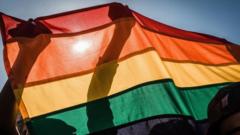The World Bank has announced it will be lifting its ban on loans to Uganda, a policy it had put in place two years prior when the country enacted some of the world's harshest laws against LGBTQ individuals. In 2023, the Ugandan government approved a new Anti-Homosexuality Act, which introduced severe penalties, including death sentences for engaging in certain same-sex acts. This legislation has led to widespread human rights violations, including evictions, violence, and arrests based on sexual orientation, as reported by local advocacy groups.
Recently, however, the World Bank expressed confidence in new 'mitigation measures' designed to ensure that future funding will not harm or discriminate against the LGBTQ community. A spokesperson remarked that the organization can only fulfill its mission to alleviate poverty and foster prosperity when all individuals, regardless of sexual orientation, can equally participate in funded projects. The bank plans to collaborate closely with the Ugandan government and various stakeholders to implement these anti-discrimination protocols.
In addition to the lifting of the loan ban, new initiatives focused on "social protection, education, and management of forced displacement and refugees" have been approved by the World Bank. Experts highlight that the bank is one of Uganda's largest external financing sources, significantly impacting infrastructure projects, including road improvements and expanding electricity access.
Despite this funding, some economists criticize both the World Bank and the International Monetary Fund (IMF) for their financial models, arguing that these methods foster dependency and inhibit sustainable growth by imposing stringent loan conditions. Uganda is not alone in its restrictive policies; other African nations like Ghana and Kenya have also moved towards limiting LGBTQ rights in recent years.
The passage of Uganda's Anti-Homosexuality Act in 2023 incurred significant international backlash, leading to an estimated loss of $470 million to $1.7 billion in investments due to halted financing. Critics of the Ugandan government insist that its anti-LGBTQ stance distracts from more pressing issues such as unemployment and systemic political oppression, labeling it as a diversionary tactic.
The new law has heightened violence against LGBTQ individuals, with reports indicating that victims of homophobic attacks feel increasingly vulnerable in their communities. Additionally, the legislation criminalizes the advocacy for LGBTQ rights, imposing heavy penalties on anyone promoting their cause, a claim the Ugandan authorities refute. This situation underscores the ongoing struggle for rights and recognition faced by LGBTQ citizens in Uganda and the broader African context.


















